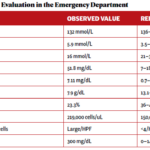Changes to Medicare benefits in 2025 include an annual $2,000 cap on out-of-pocket costs for covered Part D drugs and a new, voluntary Medicare Prescription Payment Plan intended to help beneficiaries manage drug costs.
Telemedicine Flexibilities for Controlled Substance Prescriptions Extended Through 2025
A third extension of telemedicine flexibilities will continue to allow prescription of controlled substances via telemedicine without an in-person visit through the end of 2025.

Rheum for Everyone, Episode 15: Hope Eternal (video)
In this episode of his monthly video series for The Rheumatologist, physician editor Dr. Bharat Kumar talks about the tenacity of hope.
2024 Rheumatology Fellowship Match Day Results
Match Day Results Highlight Continued Interest in Adult Rheumatology & Sharp Declines in Pediatric Rheumatology The ACR applauds another successful recruitment season for rheumatology and welcomes an impressive pool of applicants to the specialty. Ninety-nine percent of adult rheumatology positions were filled for the 2024 appointment year as part of the National Resident Matching Program…
Prevalence of Fibromyalgia & Widespread Pain in Psoriatic Arthritis: Association with Disease Severity Assessment in a Large U.S. Registry
According to a new study, fibromyalgia prevalence is elevated in PsA and is associated with elevated disease measures, confounding reliable disease assessment for treat-to-target goals.
What Clinical Factors Affect Length of Transition to Psoriatic Arthritis in Patients with Psoriasis?
Objective We aimed to identify clinical and demographic features associated with the interval between the appearance of psoriasis and the onset of psoriatic arthritis (PsA). Methods We identified patients with psoriasis and PsA diagnoses from our tertiary care psoriatic disease biorepository: a longitudinal, real-world database including clinical information and patient-reported outcomes. We used a multivariable,…

Case Report: Uncommon Complications in ANCA-Associated Vasculitis
Anti-neutrophil cytoplasmic antibody (ANCA) associated vasculitis is a rare autoimmune condition characterized by inflammation of small- and medium-sized vessels. ANCA-associated vasculitis can lead to multisystem organ complications, including life-threatening pulmonary hemorrhage, renal failure and death. We present a case of ANCA-associated vasculitis complicated by complement-mediated thrombotic microangiopathy (c-TMA). Of the rheumatic diseases, systemic lupus erythematosus…

The Ethical Tug-of-War Over Biosimilar Adoption
The advent of biosimilar medications has offered the promise of significant cost savings for healthcare systems and patients. Biosimilars are highly similar versions of existing biologic drugs, providing a more affordable alternative once the original biologic patent expires. However, the adoption of biosimilars in the U.S. has been hampered by myriad roadblocks, many of which…

Q&A with a Rheumatologist-Hospitalist
As rheumatology fellows around the country begin to explore various career opportunities, they typically look to academic rheumatology, private practice, industry and research. Vivek K. Murthy, MD, MSc, however, has carved a unique clinical pathway in both rheumatology and hospital medicine, merging his various skills and interests in medical education, diagnostic expertise and clinical problem…

An Approach to Physical Activity & Exercise in Axial Spondyloarthritis
‘Physical therapy is a mainstay of managing rheumatic diseases, but what’s the evidence, how do we monitor, and what types of therapy should we advocate?’ asks Physician Editor Bharat Kumar, MD, MME, FACP, FAAAAI, RhMSUS. ‘Here, we provide some practical recommendations for the everyday rheumatologist.’ Physical activity, including occupational and recreational activities, is one of…
- « Previous Page
- 1
- …
- 39
- 40
- 41
- 42
- 43
- …
- 842
- Next Page »